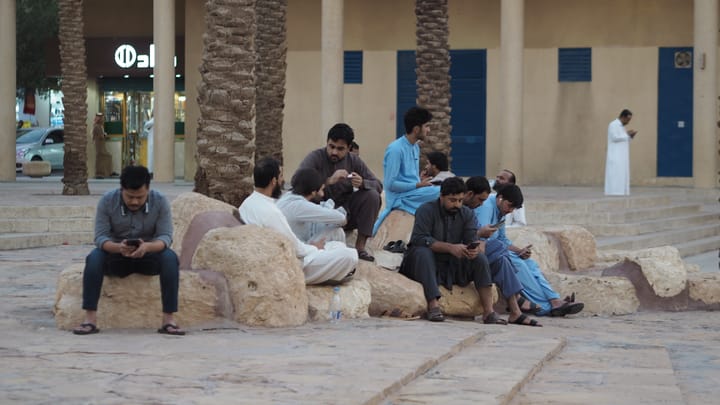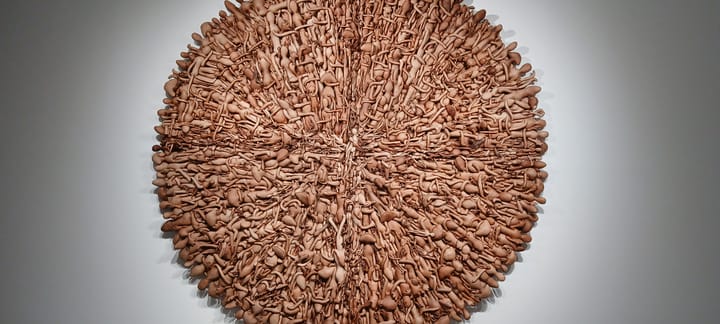[¿] advocacy’s antonym = complicity [?] {interrupted by Lavender}
… going through the sale theory books at Verso, striking how monotonous the refrain is that these books deal with the present.
Strikes me, because it is exactly of the present that we are forgetful.
A Lavender user: “I would invest 20 seconds for each target at this stage, and do dozens of them every day. I had zero added-value as a human, apart from being a stamp of approval.” – (source)
“It saved a lot of time.”
back to Verso:
Book after book:
- in Glitch Feminism the divide between the digital and the real world no longer exists (Legacy Russell)
- in Immediacy, or The Style of Too Late Capitalism contemporary cultural style boosts (what else?) transparency and immediacy, values absorbed from our current (!) conditions of disintermediation, meaning services like Uber “but for art” (!?) cutting out the middle man … “Immediacy names this style …” (Anna Kornbluh)
- On the New … need I say more (Boris Groys)
- 24/7: the ruinous consequences of “the expanding non-stop processes of twenty-first-century capitalism” … [here a blending of uber-timeliness and a super-over-determining temporality: like China Miéville’s train in Iron Council that lays down its track in front of it.] (Johnathan Crary)
- Hal Foster in What Comes After Farce? confronts the present: where does the “double predicament” (o, innumerable predicaments; perhaps best to characterise the present as predicamental) of post-truth and post-shame politics leave “artists and critics on the left?”
- Hito Steyerl “wonders how we can appreciate, or even make art, [sic] in the present age.”
- In The Social Photo the rise of the smart phone and social media have made cameras ubiquitous. They are “infiltrating,” like enemy operatives, nearly every aspect of social life, their screens glowing with malicious intent. (Nathan Jurgenson)
- “Given our anxieties today about the impact of Artificial Intelligence on labour and art,” Abigail Susek, herself an author of books, writes on With and Against, that Dominique Routhier’s study of the Situationist International “could not be more timely.” I didn’t know that Guy Debord wrote about the impact of AI on labour and art. It makes me anxious to think that maybe he did.
- on the Situationists again, in McKenzie Wark’s The Beach Beneath the Street, their legacy continues to inspire activists, artists and theorists around the world, up to the present we’re living in right now.
- in Automation and the Future of Work, we’re living on the cusp of rapid technological automation heralding the end of work. (Aaron Benanav)
- Henri Lefebvre’s Critique of Everyday Life is just that in three volumes.
- increased politicisation of artistic practice since the twentieth century’s “bleak” beginning (Revolutionary Time and the Avant-Garde, John Roberts), neoliberalism’s failure and austerity forcing millions into the precariat, leaving the left trapped in “stagnant political practices that offer no respite” [my emph.] in its sequel (Inventing the Future, Nick Srnicek and Alex Williams).
- Many people have to “double-down” on wage-slavery, working harder, doing overtime and learning to hustle. (Jason Read’s The Double Shift: Spinoza and Marx on the Politics of Work) A must read for students of contemporary capitalism, says Kathi Weeks.
- Work on the contemporary scene also the topic of Frédéric Lordon’s Willing Slaves of Capital. Renewed interest in communism allegedly paired with an “abandonment of any concrete political perspective in Communism and Strategy (Isabelle Garo). The breaking of the iron law of social reproduction in Transclasses, Chantal Jacquet.
- Systems Ultra describes a world of networked technologies, global supply chains and supranational regulations we are told is impossible to understand and far beyond our control. (Georgina Voss)
- James Bridle’s New Dark Age: we live in times of increasing inscrutability. Sinews of War and Trade: China is now the factory of the world. A “parade” of ships full of raw commodities, iron ore, oil, coal, arrive in its ports and “fleets” of container ships leave full of manufactured goods (Laleh Kahlili). The key to understanding the future lies in the past in Lizzie O’Shea’s Future Histories. Road to Nowhere shows us what Silicon Valley, in the words of the subtitle, gets wrong about the future of transportation (by the wonderfully named Paris Marx). Everywhere we turn a “startling” new device promises to transfigure our lives (if not revolutionise them). That’s Radical Technologies, Adam Greenfield.
- While in an “original and timely book,” well, aren’t they all? Matteo Pasquinelli unpacks the intelligence of artificial intelligence. At a moment, just this moment, “when apostles and prophets” proclaim both a “utopian world of effortless control and a catastrophe of extinction.” (The Eye of the Master)
- our finances, politics, media, opportunities, information, shopping and knowledge production are mediated through algorithms in Revolutionary Mathematics, Justin Joque (really). And what happened to the public intellectuals “that” used to challenge and inform us? asks McKenzie Wark in General Intellects, generally answering their own question. Who can argue with Fredric Jameson? It’s an age of globalization characterized by the dizzying technologies of the First World and the social disintegration of the Third World where the question of utopia is possibly meaningless. (Archeologies of the Future)
- our standing, walking body holds the social traumas of history and its racialised inequalities, even, in How We Walk, Matthew Beaumont.
- walking in the other direction, by walking you escape from the very idea of identity, the temptation to be someone, to have a name and a history (A Philosophy of Walking, Frédéric Gros).
- in the history of colonialism, racism, sexism, capitalism, there has long been a dividing line between bodies “worthy of defending” and those who have been disarmed and rendered defenseless. Illustrations will be found. (Self-Defense, Elsa Dorlin)
- the crisis-laden capitalism of the 21st century lingers on (possibly because so does the 21st century) in Mute Compulsion, Søren Mau. Don’t despair, one of them was saved: in The New Spirit of Capitalism sociologists Luc Boltanski and Eve Chiapello go to the heart of changes in contemporary capitalism. Don’t presume, theories of “postmodern” fragmentation, “difference” and contingency can barely accommodate the idea of capitalism, Ellen Meiksins Wood, Democracy Against Capitalism. One of them was damned.
- an increasingly authoritarian present. This is Late Fascism, Alberto Toscano.
- from the outset liberalism, as a philosophical position and ideology, has been bound up with the most illiberal of policies: slavery, colonialism, genocide, racism and, worse, snobbery. Liberalism, Domenico Losurdo.
- Jessica Whyte uncovers the place of human rights in attempts to develop a moral framework for a market society. Rather than rejecting rights, neoliberals developed a distinctive account of human rights as tools to depoliticise civil society, protect private investments and shape liberal subjects. The Morals of the Market, human rights in their fatal embrace.
- contemporary debates on Black radicalism and decolonisation have lost sight of the concerns that animated their twentieth-century intellectual forebears. Red Africa, Kevin Ochieng Okoth.
- another school, another legacy. The Frankfurt School, Immanent Critiques, Martin Jay; the work done by its founding members continues in the twenty-first century to unsettle conventional wisdom about culture, society and politics, Splinters in Your Eye, also Martin Jay.
- unsparing in its contention that with almost no exceptions the post-Hegelian tradition prepared the ground for fascist thought. The main culprits, Friedrich Nietzsche and Martín Heidegger are accused, in turn, of introducing irrationalism into social and philosophical thought, pronounced antagonism to the idea of progress in history, an aristocratic view of the masses and, consequently, hostility to socialism, in its classic expression comprising movements for popular democracy, especially, not exclusively, the expropriation of most private property in terms of material production. Georg Lukács, The Destruction of Reason.
- Why do Benjamin, Adorno, Marcuse, Horkheimer matter today? in the words of the title of another book, the ruthless critique of everything existing (Andrew Feenberg) but, this one, Stuart Jeffries’s Grand Hotel Abyss, to end on an up note, looks much more fun.
>>>>>>>>>>><<<<<<<<<<<
The chain of association I form with the term advocacy leads directly to the New Zealand Arts Council, aka Creative New Zealand, aka the Queen Elizabeth II Arts Council and, it will not be spoken but it must now be since as such it is in statute, the King Charles III Arts Council of New Zealand.
Why it should do so is not very interesting but that it might help clarify the meaning of advocacy might be.
What the Arts Council’s role is is a matter for policy, where, in the making of policy, for arts and culture, there has over successive governments in NZ been nothing.
Once upon a time the role of the Arts Council was funding and, at an even greater distance in time from us, once upon a time, the legend goes, the role of the Arts Council was advocacy, to advocate, on behalf of artists and arts organisations, to the government. It seems absurd now. That government would have, would ever have had, council officials turning up asking for this or that on behalf of artists, even $$$, seems absurd, especially $$$. Everyone now knows that the government’s job is to save not spend, to pay overseas debt. Payments were reported in September 2023 to be at @3% of USD204,500,000,000, going by the exchange rate 23 March 2024, that’s NZ$341,060,805,500, so NZ$11,368,693,516,666.67 per anum.
In 2000 I had the idea, although the figures were not as overwhelming and the prospect not as absurd of asking for $$$, that advocacy might take another form. Advocacy might take a political form and the Arts Council advocate for the political protection of artists and arts organisations.
The Arts Council could advocate on behalf of artists and arts organisations that what they do, the making they do of art works of every form, be given political protection under statute, the statute, it turns out, already in place at the foundation of the Arts Council, of being a patron. The Arts Council, a crown entity, is in statute under the patronage of his Royal Highness Charles III.
Political protection, that of patronage, would confer on artists and arts organisations a positive freedom, the legal right guaranteed by the legislature, the legal right to cultural production. Artists and arts organisations would be free to make art in whatever form they wished. The central question would cease to be, Where’s the money supposed to come from? And so would the central answer. Funding policy should then be directed to vouchsafing to those artists and arts organisations no more and no less than the freedom to create.
I wrote that this political principle was higher than the economic principle here.
Today I think of this as a positive statement and opposed to the sort of objective view that would repeat the economic question and answer’s centrality in arts’ funding, Where’s the money supposed to come from? To the question of funding it opposes that of advocacy, its answer that higher than the economic principle (of patronage) is the political principle (of patronage) protecting the creative freedom of artist and arts organisation.
I also think of advocacy in this positive sense as opposing the diagnostic view that would simply repeat the problems faced by artists and arts organisations in New Zealand Aotearoa. |…|
legitimating them |…|
|…| = break
the occasion for the above reverie was Shayne Carter’s
‘Art has always been completely undervalued’
<<<<<<<<<<<<<<<<<>>>>>>>>>>>>>>><>>>>>>>>>>>>>>>>>>>&
for another occasion, a post from CNZ on F___B___:
Friday fact: Arts participation for young people ‘with complex needs’ is beneficial to their sense of belonging and ability to cope with difficult feelings.

Find more facts: https://creativenz.govt.nz/fact-finder
Evidence matters. If you haven’t checked out our Fact Finder yet, dive in! Use this data to support your storytelling and advocacy to create compelling stories about the value of arts, culture, creativity and ngā toi Māori.
this was posted as
Fact finder for Arts Advocates
in the creative community, we are all now arts advocates, while CNZ is …?


